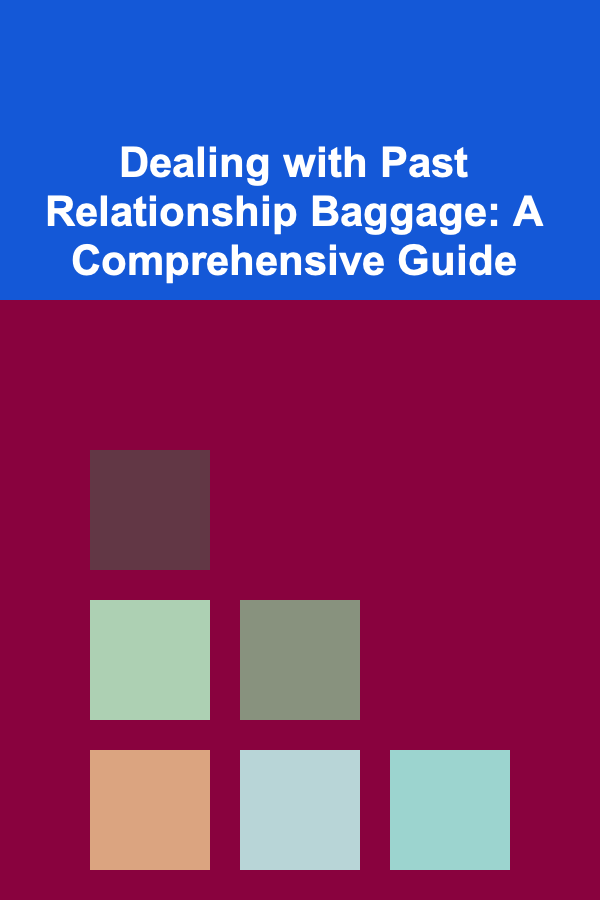
Dealing with Past Relationship Baggage: A Comprehensive Guide
ebook include PDF & Audio bundle (Micro Guide)
$12.99$7.99
Limited Time Offer! Order within the next:

Past relationships, like experiences in general, leave their mark on us. These imprints, often referred to as "baggage," can manifest as unresolved emotions, learned (often negative) behaviors, and deeply ingrained beliefs about ourselves, relationships, and the opposite sex. While it's unrealistic to expect to enter a new relationship as a completely blank slate, unaddressed baggage can sabotage future connections, leading to repeating patterns of unhealthy behavior and ultimately, relationship failure. This article delves into the intricacies of past relationship baggage, exploring its various forms, its impact on current and future relationships, and providing a comprehensive framework for processing and ultimately, releasing it.
Understanding the Nature of Relationship Baggage
Relationship baggage isn't simply a collection of memories. It's the unprocessed emotional residue of past experiences. It's the anger you still feel about your ex's infidelity, the insecurities that linger after being constantly criticized, or the fear of commitment stemming from a previous painful breakup. It can be subtle, influencing your behavior unconsciously, or overt, manifesting as explicit distrust and defensiveness.
Different Forms of Baggage
- Emotional Scars: These are the lasting emotional impacts of hurtful events like betrayal, abuse (emotional, physical, or sexual), or significant loss. They can manifest as anxiety, depression, difficulty trusting, and low self-esteem.
- Learned Behaviors: We often unconsciously adopt behaviors from past relationships, both positive and negative. For example, if your parents had a pattern of passive-aggressive communication, you might unconsciously replicate that in your own relationships. Similarly, if you were constantly coddled, you might seek out partners who enable that behavior.
- Negative Beliefs: Past experiences can shape our core beliefs about ourselves and relationships. Examples include: "I'm not lovable," "All men/women are the same," "I'm destined to be alone," or "I can't trust anyone."
- Unrealistic Expectations: Sometimes, we carry expectations into new relationships that are based on idealized or unrealistic portrayals of love and partnership, often gleaned from media or past (often flawed) relationships.
- Unresolved Grief: Even in relationships that weren't overtly negative, a breakup can trigger grief. If this grief is not processed properly, it can linger and affect future relationships. This can include grief over the lost future, the lost connection, and the changes in your own identity that resulted from the relationship.
- Fear of Vulnerability: Being hurt in a past relationship can make us hesitant to open up and be vulnerable in future relationships. This can create a barrier to intimacy and prevent the development of a deep connection.
- Control Issues: Feeling powerless in a past relationship (perhaps due to manipulation or emotional abuse) can lead to a desire for control in future relationships, often manifesting as jealousy or possessiveness. Conversely, being too controlling in a past relationship may lead to fear of repeating that behavior.
- Insecurity and Low Self-Esteem: Constant criticism, rejection, or infidelity can significantly damage self-esteem, leading to feelings of inadequacy and a constant need for reassurance in future relationships.
The Impact of Baggage on Current and Future Relationships
Unresolved baggage acts as a filter through which we perceive and interact with our partners. It can distort our perceptions, trigger unnecessary conflict, and ultimately, undermine the foundations of a healthy relationship. The effects can be wide-ranging:
- Distorted Perceptions: Baggage can lead us to misinterpret our partner's actions and intentions. For example, if you were cheated on in the past, you might be overly suspicious of your current partner, even without any concrete evidence of wrongdoing. This suspicion can erode trust and create unnecessary tension.
- Emotional Reactivity: Past trauma can trigger intense emotional reactions to seemingly minor events. A simple disagreement can quickly escalate into a full-blown argument if it touches upon unresolved issues from the past. This heightened reactivity can be exhausting for both partners.
- Self-Sabotaging Behaviors: Baggage can lead to self-sabotaging behaviors, such as pushing your partner away, creating unnecessary drama, or testing their loyalty. These behaviors are often unconscious attempts to protect ourselves from getting hurt again, but they ultimately push our partners away.
- Difficulty Trusting: A history of betrayal or deception can make it incredibly difficult to trust a new partner, even if they are trustworthy. This lack of trust can manifest as constant questioning, monitoring, and a general sense of unease in the relationship.
- Communication Breakdown: Baggage can interfere with effective communication. For example, fear of vulnerability might lead to withholding feelings, while anger and resentment might lead to aggressive or passive-aggressive communication.
- Avoidance of Intimacy: The fear of getting hurt can lead to avoidance of emotional and physical intimacy. This can create a sense of distance and loneliness in the relationship.
- Repeating Unhealthy Patterns: Without conscious effort, we tend to repeat patterns from past relationships, even if those patterns were detrimental. This can lead to a cycle of unhealthy relationships, where we find ourselves in similar situations with different partners.
- Unrealistic Expectations: Carrying unrealistic expectations from past relationships (or even from societal ideals) can lead to disappointment and resentment. Expecting your partner to fulfill all your needs or to be perfect is a recipe for disaster.
The Path to Healing: Steps to Deal with Past Relationship Baggage
Addressing relationship baggage is a journey, not a destination. It requires self-awareness, honesty, and a willingness to confront uncomfortable truths about yourself and your past. The following steps provide a framework for navigating this process:
1. Self-Awareness: Recognizing the Baggage
The first step is to become aware of the baggage you're carrying. This requires honest self-reflection and a willingness to identify patterns of behavior, emotional triggers, and negative beliefs that might be stemming from past relationships. Ask yourself these questions:
- What are my biggest fears in relationships?
- What makes me feel insecure or anxious in relationships?
- Do I tend to repeat the same mistakes in relationships?
- What are my "dealbreakers" in relationships? (And are they truly dealbreakers, or are they rooted in past trauma?)
- What are my negative beliefs about myself and relationships?
- How do I typically react in conflict situations?
- What are my communication patterns? Are they healthy and effective?
- Do I find myself comparing my current partner to past partners?
- What unresolved emotions (anger, sadness, resentment) am I still carrying from past relationships?
- What are my common emotional triggers? What situations or behaviors tend to set me off?
Keeping a journal can be a helpful tool for tracking your thoughts, feelings, and behaviors in relationships. Pay attention to patterns and connections between your past experiences and your current reactions.
2. Acknowledging and Validating Your Feelings
Once you've identified your baggage, it's crucial to acknowledge and validate your feelings. Don't dismiss or minimize your emotions. It's okay to feel angry, sad, hurt, or scared. Your feelings are valid, regardless of whether or not they seem "rational" to others. Allow yourself to feel the emotions without judgment.
Practice self-compassion. Treat yourself with the same kindness and understanding you would offer a friend who is going through a difficult time. Recognize that you are doing the best you can with the resources you have, and that healing takes time.
3. Understanding the Root Cause
Dig deeper to understand the root cause of your baggage. Where did these negative beliefs and behaviors originate? What specific experiences contributed to your emotional wounds? This process might involve revisiting painful memories, but it's essential for gaining clarity and perspective. Consider these questions:
- What specific events in my past relationships contributed to my current fears and insecurities?
- What were the dynamics of my past relationships? What roles did I play?
- What lessons (both positive and negative) did I learn from my past relationships?
- What were my needs and expectations in my past relationships? Were they realistic? Were they met?
- What were the red flags that I ignored in my past relationships?
- What were my contributions to the failures of my past relationships? (Be honest with yourself -- this isn't about blaming yourself, but about taking responsibility for your part in the equation).
4. Processing Your Emotions
Simply understanding the root cause isn't enough. You need to actively process the emotions associated with your past experiences. This can involve a variety of techniques:
- Therapy: Working with a therapist is often the most effective way to process past trauma and develop healthy coping mechanisms. A therapist can provide a safe and supportive space to explore your feelings, challenge negative beliefs, and learn new skills for managing your emotions. Cognitive Behavioral Therapy (CBT), Eye Movement Desensitization and Reprocessing (EMDR), and Trauma-Informed Therapy are particularly helpful for addressing relationship baggage.
- Journaling: Writing about your experiences can help you to process your emotions and gain clarity. Write about your feelings, your thoughts, and your memories. Don't censor yourself -- just let the words flow.
- Creative Expression: Expressing your emotions through art, music, dance, or other creative outlets can be a powerful way to release pent-up feelings.
- Mindfulness and Meditation: Mindfulness practices can help you to become more aware of your thoughts and feelings without judgment. This can help you to identify and manage your emotional triggers.
- Support Groups: Connecting with others who have similar experiences can provide a sense of validation and support. Support groups can help you to feel less alone and to learn from the experiences of others.
- Forgiveness (of Yourself and Others): Forgiveness is not about condoning harmful behavior. It's about releasing the anger, resentment, and bitterness that are holding you back. Forgiving yourself for your mistakes and forgiving others for their transgressions can be a liberating experience. This is a process, not an event, and it may take time.
5. Challenging Negative Beliefs
Identify and challenge the negative beliefs you've developed as a result of your past experiences. Are these beliefs truly accurate, or are they based on limited or distorted information? Question the evidence that supports these beliefs and look for evidence that contradicts them. Reframe your negative beliefs into more positive and realistic ones.
For example, if you believe "I'm not lovable," challenge that belief by asking yourself: "What evidence do I have that I'm not lovable? Have I ever been loved by anyone? What are my positive qualities? What makes me a good friend, family member, or partner?" Then, try to reframe the belief into something more positive, such as "I am worthy of love, even if I haven't always felt that way in the past."
6. Developing Healthy Coping Mechanisms
Learn healthy coping mechanisms for managing stress and emotional triggers. This might involve relaxation techniques, exercise, spending time in nature, or engaging in hobbies that you enjoy. Avoid unhealthy coping mechanisms, such as substance abuse or emotional eating, as these can exacerbate your problems in the long run.
7. Setting Healthy Boundaries
Learn to set healthy boundaries in your relationships. Boundaries are the limits you set to protect your emotional, physical, and mental well-being. They define what you are and are not willing to tolerate in a relationship. Setting boundaries can help you to prevent being taken advantage of, to maintain your self-respect, and to create healthier relationships.
8. Communicating Effectively
Develop effective communication skills. Learn to express your needs and feelings clearly and assertively, without being aggressive or passive-aggressive. Practice active listening and empathy. Be willing to compromise and to work together to resolve conflicts.
9. Choosing Healthy Partners
Be mindful of the types of partners you choose. Are you attracted to people who are emotionally unavailable, manipulative, or abusive? If so, it's important to understand why and to break that pattern. Seek out partners who are emotionally healthy, supportive, and respectful. Look for someone who is willing to communicate openly, to compromise, and to work together to build a healthy and fulfilling relationship.
10. Being Patient and Kind to Yourself
Healing from past relationship baggage takes time and effort. Be patient with yourself and don't expect to see results overnight. There will be setbacks along the way, but don't let them discourage you. Keep practicing the skills you've learned and remember to be kind to yourself throughout the process.
When to Seek Professional Help
While self-help strategies can be beneficial, sometimes professional help is necessary. Consider seeking therapy if:
- You are experiencing symptoms of anxiety or depression.
- You are having difficulty trusting others.
- You are engaging in self-destructive behaviors.
- You are having difficulty managing your emotions.
- Your past experiences are significantly impacting your daily life.
- You are in an abusive relationship.
- You have experienced trauma.
- You are unable to cope with your emotions on your own.
A therapist can provide a safe and supportive space to explore your feelings, challenge negative beliefs, and develop healthy coping mechanisms.
Moving Forward: Building Healthy Relationships
Dealing with past relationship baggage is not just about healing from the past; it's about building a brighter future. By addressing your emotional wounds, challenging negative beliefs, and developing healthy relationship skills, you can create the foundation for healthy, fulfilling relationships. Remember to focus on:
- Self-love and self-acceptance: Love and accept yourself for who you are, flaws and all. Recognize your worth and value.
- Healthy communication: Communicate openly, honestly, and respectfully with your partner.
- Trust and honesty: Build a foundation of trust and honesty in your relationship.
- Empathy and compassion: Be empathetic and compassionate towards your partner's feelings and needs.
- Shared values and goals: Choose a partner who shares your values and goals.
- Mutual respect: Treat your partner with respect and expect to be treated with respect in return.
- Commitment and effort: Be committed to the relationship and willing to put in the effort to make it work.
- Forgiveness and letting go: Be willing to forgive yourself and your partner for mistakes. Learn to let go of resentment and anger.
- Continuous growth: Continuously work on improving yourself and your relationship.
By embracing these principles, you can create relationships that are built on love, trust, and mutual respect, free from the shackles of past baggage.
Reading More From Our Other Websites
- [Home Party Planning 101] How to Plan the Ultimate Dinner Party at Home
- [Personal Care Tips 101] How to Boost Your Confidence with Smooth, Exfoliated Skin
- [Home Lighting 101] How to Choose the Best Task Lighting for Your Home Office Productivity
- [Hiking with Kids Tip 101] Adventure Safely: How to Teach Children the Golden Rules of Hiking
- [Personal Care Tips 101] How to Create a Sensory-Friendly Personal Care Routine for Sensitive Individuals
- [Organization Tip 101] How to Create a Mudroom Area in Your Garage
- [Simple Life Tip 101] How to Transition to a Low‑Maintenance Indoor Plant Collection for Busy Lives
- [Personal Care Tips 101] How to Maintain Healthy Scalp and Hair with Dry Shampoo
- [Trail Running Tip 101] Innovations in Trail Running Fabrics: What's New and Why It Matters
- [Screen Printing Tip 101] Best Maintenance Routines to Extend the Life of Screens and Frames in Print Shops

How to Design a Content Promotion Checklist for Video Marketing
Read More
How to Host a Movie Night Party with Snacks and Comfort
Read More
How to Teach Language Learning Online and Grow Your Client Base
Read More
How to Use Labels to Keep Toys Organized
Read More
The Research Scientist's Guide: Mastering the Art of Scientific Inquiry
Read More
Strategic Influencer Marketing: A Comprehensive Guide
Read MoreOther Products

How to Design a Content Promotion Checklist for Video Marketing
Read More
How to Host a Movie Night Party with Snacks and Comfort
Read More
How to Teach Language Learning Online and Grow Your Client Base
Read More
How to Use Labels to Keep Toys Organized
Read More
The Research Scientist's Guide: Mastering the Art of Scientific Inquiry
Read More